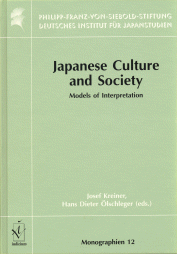Japan und Ostasien
Germanistik /
Deutsch als Fremdsprache
Kulinaristik
Kulturwissenschaften
|
 |
Senden Sie Fragen oder Kommentare zu dieser Website an:
info@iudicium.de
iudicium verlag
Dauthendeystr. 2 · 81377 München
Deutschland
Copyright · 2024
|
|
| |
|
 Kreiner, Josef; Ölschleger, Hans Dieter (Eds.) Kreiner, Josef; Ölschleger, Hans Dieter (Eds.)
Japanese Culture and Society. Models of Interpretation
1996 • ISBN 978-3-89129-492-5
361 S., geb.; EUR 45,-
Monographien aus dem Deutschen Institut für Japanstudien (Bd. 12)
This is not a book on Japan or on some aspects of Japanese culture and society. It is a book on the representation of Japan in Western society, and therefore it deals with our thoughts.
The topic of this book is the construction of phenomena labeled Japanese culture, Japanese society or the Japanese by means of a corpus of theoretical and methodological proceedings called 'social science' or 'humanities.' Everyone familiar with the results of Japan-related scholarship is aware of the multitude of approaches developed since the Meiji Restoration, when the opening of the country to foreigners made systematic studies of the culture and society of Japan possible. These approaches made themselves felt in academic thinking to varying degrees at different times, thereby indicating that not only epistemological reasoning - in support of scientific progress - but also social developments and ideological undercurrents outside of academia influenced the image of Japan which was presented as the result of research. In order to come to a better understanding of present-day Japan, it is a precondition to reappraise these explanatory models of Japanese culture and society.
The editors view the approaches presented in this volume as part of the wider field of the representation of Japan in Western society, a representation which, even at the risk of oversimplification, it seems fair to characterize as shaped by stereotypes from its very beginnings. Therefore, one of the most important tasks in reviewing the efforts of Japanese studies seems to be the identification of external influences on the academic approach to Japanese culture and society. Once this is done, a revision of the Western image of Japan might be undertaken in order to break down stereotypes and clichés.
|
Beiträge
- Kreiner, J./Ölschleger, H. D.: Preface
- Distelrath, G.: The Paradigm of Eternal Recurrence: How the Structure of Academic Debate on the Japanese Economy itself Founded the "Japan Incorporated" Stereotype
- Berque, A.: The Japanese Thought of Milieu (fudo): From Peculiarism to the Quest of the Paradigm
- Ölschleger, H. D.: The Tumbling Walls of the Ivory Tower: Cultural Anthropology Meets the Japanese
- Linhart, S.: Community Studies on Japan
- Kuwayama, T.: The Familial (ie) Model of Japanese Society
- Mouer, R./Tsuboi, T./Wearne, B.: The Multi-Dimensional Stratification Model: A Focus on Variation and the Comparative Perspective
- Sugimoto, Y.: The Conflict Model of Japanese Society
- Pörtner, P.: How to Conflict Intelligently: Six Notes Concerning the Processing of Dissent in Japan
- Lenz, I.: On the Potential of Gender Studies for the Understanding of Japanese Society
- Johnson, F. A.: Interdependent Affiliation among Japanese: The Many Facets of amae
- Hamaguchi, E.: The Contextual Model in Japanese Studies
|
|
